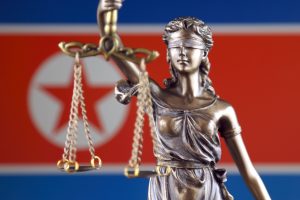In March 2023, the International Criminal Court (ICC) issued arrest warrants for Russian President Vladimir Putin and three of his close associates, causing a stir in the international community. Putin and one of his aides are accused of committing crimes against children and civilians in Russia’s occupied areas of Ukraine, while two Russian generals are charged with attacking Ukraine’s electrical infrastructure.
ICC Prosecutor Karim Khan, who requested the arrest warrant, compared Putin to Nazi war criminals and Slobodan Milosevic, the perpetrator of ethnic cleansing in the Balkans.
Similarly, there are growing calls for North Korean leader Kim Jong Un to be held accountable for providing war supplies to Putin. International law experts argue that Kim could be charged with at least aiding and abetting war crimes or even being an accomplice to Putin’s crimes.
In light of satellite images confirming North Korea’s supply of weapons and ammunition to Russia – evidenced by over 7,000 container boxes – and Ukrainian authorities verifying the use of these munitions against Ukraine, North Korea is implicated in aiding and abetting war crimes as outlined in the Rome Statute, the founding document of the ICC. It is assessed that North Korea’s actions fall under Article 25(3)(c) of the Rome Statute, which covers “facilitating the commission of such a crime, aiding, abetting, or otherwise assisting in its commission or its attempted commission, including providing the means for its commission.”
Professor Song Sang-hyun, who served as the ICC president for six years from 2009 to 2015, suggested that Kim could face even an harsher punishment than those who aid and abet war crimes, potentially being prosecuted as a co-perpetrator alongside Putin. Song argued that Article 25 of the Rome Statute clearly establishes Putin as the principal offender in the Ukraine war and Kim as an accomplice. But Song emphasized that, depending on the collection of evidence and the development of the situation, Kim could be prosecuted as a co-perpetrator with Putin.
Calls to charge Kim Jong Un at the ICC were being made long before the Ukraine war. International law experts and United Nations human rights organizations have raised their voices over North Korea’s extreme human rights violations, deprivation of food rights, and forced labor of overseas workers. Of note was a mock trial conducted in 2022 by five former ICC judges. Their report concluded that, given widespread human rights abuses in North Korea, its leaders would be found guilty of most of the 11 types of crimes against humanity specified in the ICC’s Rome Statute.
The fact that Kim has not yet been included on the ICC’s list of suspects subject to investigation is not because his actions are less severe compared to Putin’s crimes. The ICC targets individuals who have committed genocide or crimes against humanity in both peacetime and wartime, particularly those who cannot be prosecuted under their own country’s domestic law. While the arrest warrant issued for Putin pertains specifically to his criminal activities in the Ukraine war, Kim’s crimes against his own people during peacetime are extensive.
The reason Kim Jong Un remains unscathed is that the criteria for filing a complaint against him have not been met. According to the Rome Statute, there are only two ways to bring a case to the ICC: Either a complaint is filed from within the affected country, or the United Nations Security Council refers the case. So far, neither of these conditions has been fulfilled. However, now that North Korea’s war crimes in Ukraine have been confirmed, there is an opportunity for the Ukrainian authorities, as the victims, to file a complaint against North Korea with the ICC.
While a complaint filed by Ukraine would be ideal, the ICC prosecutor also has the authority to initiate an independent investigation. There is a specific provision allowing the ICC prosecutor to start an investigation on their own initiative, even without an external complaint. This authority is based on Article 13 of the Rome Statute and is clearly outlined in the internal regulations of the Office of the Prosecutor. According to this provision, the prosecutor may open an investigation independently, and if he decides to proceed, he must seek legal authorization from the judges.
The prosecutor’s independent investigative power has been exercised eight times, including in cases involving Kenya and the Philippines. Therefore, this may be an opportune time for criminal prosecution against North Korean leaders. The ICC prosecutor should exercise his independent investigative power to gather information and materials from South Korea and Ukraine.
The most severe punitive effect is that an ICC arrest warrant has no statute of limitations, meaning the accused must carry the stigma for their entire life, which itself is a significant psychological punishment. Additionally, war crime suspects, including Putin, face de facto punishment as they are prohibited from setting foot in any of the 124 ICC member countries. This is because ICC member states are obligated to arrest and transfer suspects with outstanding arrest warrants.
The ICC is an international judicial body responsible for prosecuting and punishing malevolent rulers and their associates for their crimes against humanity. Efforts to punish or sanction rogue states internationally have proven limited, as evidenced by the ineffectiveness of the U.N. Security Council. In this context, the ICC’s efforts to take action against leaders and individuals committing crimes against humanity are highly commendable.
More instances of prosecuting and punishing those who violate global norms and agreements or engage in deviant behavior will help eradicate the roots of conflict and war. From this perspective, we hope the ICC will actively address the crimes committed by North Korean leader Kim Jong Un and his accomplices, as revealed through the Ukraine war.
































